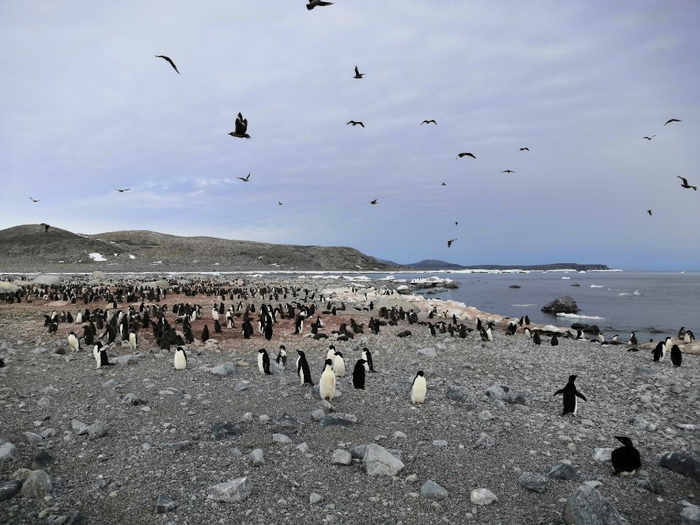Modified Circumpolar Deep Water (MCDW) intrusion is a key factor affecting climate, environment and ecosystem. Benefiting from the calories and nutrients brought in by MCDW, the Ross Sea, the most latitudinal ocean in the world, is home to a thriving ecosystem.
 Penguin population around Ross Sea. Image by GAO Yuesong.
Penguin population around Ross Sea. Image by GAO Yuesong.
A research team led by XIE Zhouqing from the University of Science and Technology of China (USTC) of the Chinese Academy of Sciences reconstructed the variability of MCDW intrusion into the Ross Sea during the past 6,000 years by measuring the Cd/P ratio in ornithogenic sediments.
Their study was published in Geophysical Research Letters.
At present, study on the variability of MCDW intrusion in historical period mainly depends on the temperature and sea ice index in the marine sedimentary column. However, these data cannot directly reflect the changes of oceanic upwelling or the impact of ocean circulation on ecosystem.
Cd taken up by marine phytoplankton was enriched along the food chain and transported to the Antarctic continent with penguin guano, making penguin guano an ideal material for linking the deep circulation of the Southern Ocean with ecosystem changes.
Through radiocarbon dating and Cd/P ratio analysis of penguin guano, the researchers found that MCDW played a key role in sea ice and ecological changes in the Ross Sea.
There were two periods of enhanced MCDW intrusion between 6000-2800 and 1600-700 BC. The researchers observed a decrease in coastal sea ice and an increase in sea surface temperature during the two periods through local diatom records, which was due to the heat from the MCDW intrusion.
Meanwhile, as the input of nutrients from MCDW led to the increased marine productivity, they also observed a surge in the local Adelie penguin populations during these two enhanced periods from the number of penguin remains found in the Ross Sea.
"This provides another toolset for our understanding the impacts of changing cryosphere on biological systems," commented by the American Geophysical Union.